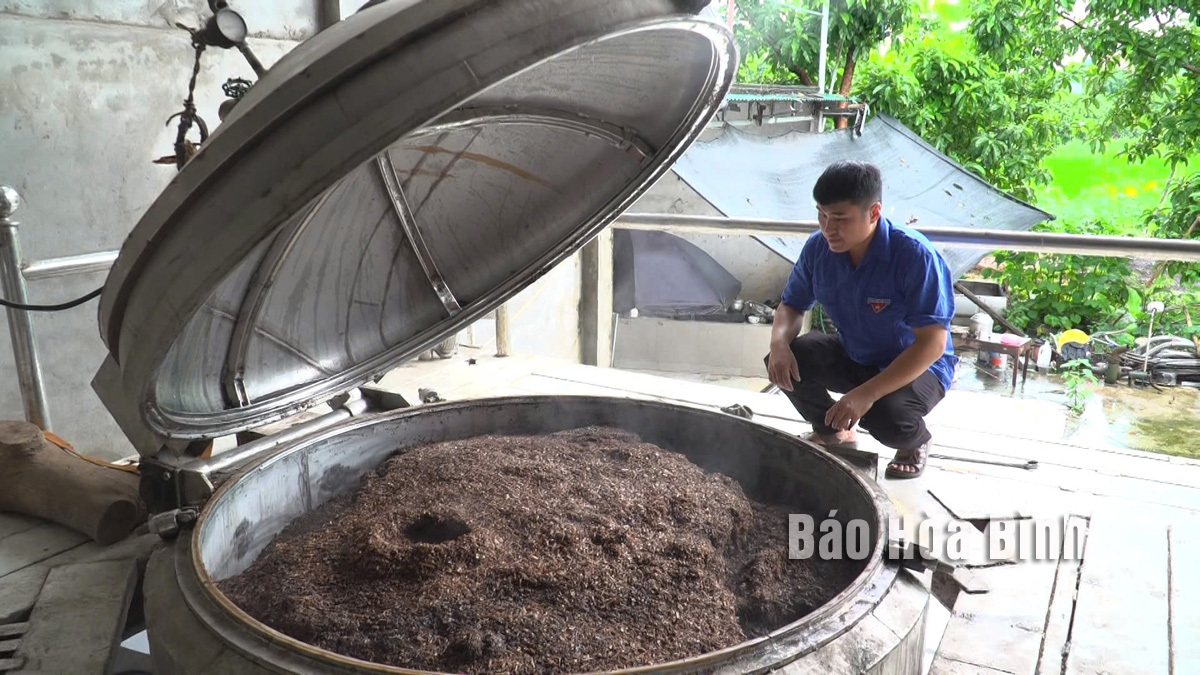
In 2016, Yen Tri commune in Yen Thuy district was recognised as a new-style rural area in 2016, an advanced new-style rural area in 2020 and a model new-style rural area in 2021, respectively. It is the first and only commune in the province meeting the criteria for model new-style rural areas.
Celastrus hindsii benth product of Yen Tri Agricultural Cooperative in Yen Thuy district is recognised as a 3-star OCOP (one commune one product) product at the provincial level. The production process strictly complies with food hygiene and safety regulations.
"Recognising the building of new rural areas as a key, comprehensive, and long-term task, the Party Committee, authorities, and people of Yen Tri commune have consistently strived to improve the quality of the criteria. Efforts have been made to prioritise the promotion and mobilisation of the people to participate in new rural area building."
Considering the construction of new-style rural areas as a key, comprehensive and long-term task over the past time, the Party Committee, authority and people of Yen Tri commune have always strived to improve the quality of the criteria. Attention has been paid to encouraging locals to participate in the scheme.
The movement "joining hands to build new-style rural areas" continues to be promoted with the motto "the State and people work together.” It was enthusiastically responded to by the majority of local residents. Notably, a model to mobilise women to buy health insurance cards for their relatives has proven effective, with the commune's health insurance coverage rate reaching 96.23%.
Inter-hamlet and inter-commune roads are cleaned regularly, with flowers and trees planted along roads, helping keep the rural environment and landscape green, clean, and beautiful. All the 13 hamlets in the commune have cultural houses, serving well community activities. The commune's central sports area and residential areas have been specifically planned.
Regarding economic development, on the basis of focusing on key and advantageous products, the commune has mobilsed people to change the structure of crops and livestock, and develop household economy associated with cooperative economy, resulting in the establishment of many effective economic models.
In the first six months of 2024, the average per capita income in the commune reached more than 37 million VND (nearly 1,500 USD). Currently, the commune has organised a group of households in Tan Thanh hamlet to grow small leeks, which signed a cooperation contract with Hung Son agriculture processing and packaging Ltd. The commune has four OCOP products meeting 3-star standards.
Chairman of the communal People’s Committee Bui Phi Diep stated that the locality always pays attention to expanding economic development models that bring high efficiency; while promoting the emulation movement of new-style rural area building. Thanks to these efforts, the income and living conditions of of people are increasingly improved, rural areas have gained a facelift, and socio-economic infrastructure has been greatly improved. Yen Tri is striving to become a model in building new-style rural areas.
Playing a key role in Hoa Binh province’s economic development, Luong Son district has been focusing on science and technology development, innovation, and digital transformation.
Identifying the application of online public services as a key step in administrative procedure reform and e-government building, Kim Boi district has proactively provided services and supported residents and businesses in accessing and utilising full-process online public services promptly and efficiently. The locality aims to lift the rate of end-to-end online public services to over 90%, with all officials and civil servants handling tasks in the digital environment.
Nguyen Anh Tuyet, hailing from a family steeped in the ancient art of herbal medicine, is transforming local medicinal herbs into high-value concentrated extracts, elevating their worth and healing potential.
Nguyen Phi Long, an alternate member of the Party Central Committee, Secretary of the Hoa Binh provincial Party Committee, and head of the steering committee for the province's key projects, chaired a conference on March 25 to discuss measures for implementing the project on constructing the Hoa Lac - Hoa Binh road and upgrading the Xuan Mai - Hoa Binh section of National Highway 6 under the public-private partnership (PPP) model.
Administrative reform has been identified as a key priority in enhancing state governance, improving the business environment, and facilitating services for citizens and enterprises.
The Standing Board of the Hoa Binh provincial Party Committee met on March 18 to review and guide major investment projects aimed at boosting local socio-economic development.



